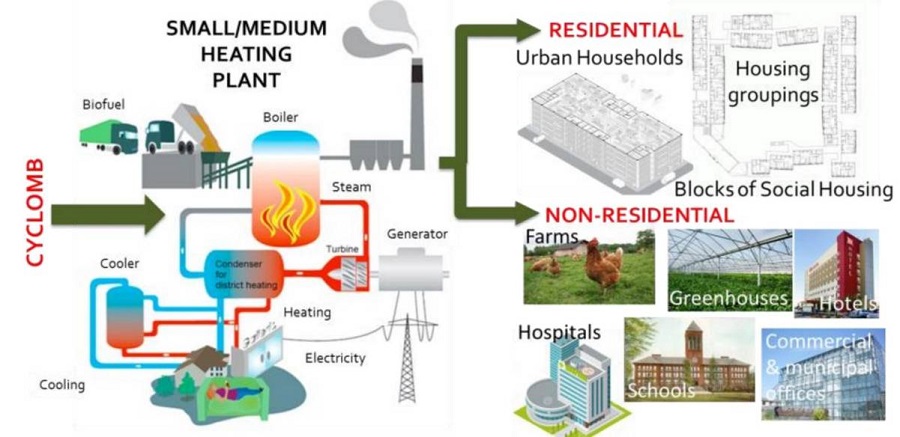European Union H2020 - Disruptive Cyclone-based technology for effective and affordable particulate matter emission reduction in biomass combustion systems
FTIPilot-2016-1. Project ID 760551
Start Date: 01/04/2017; End Date: 31/03/2019, 30/11/2020
THE BEGINNING
Solarbox, a Spanish engineering company specilized in biomass combustion service provision, realized a high need for affordable and extremely efficient particle emissions reduction for the increasing biomass sector in order to comply with EU and global legislation. A close collaboration with the University of Vigo’s expert group in biomass combustion and emission reduction technology redeNERGY as well as the long-term relationship of TAMA and KSM with Solarbox as main supplier for their products in Spain, led to the development of CYCLOMB.
It is an innovative, highly efficient and competitive cost solution for Particulate Matter abatement resulting from the integration of a cyclone-based technology and a highly combustion-efficient boiler. Our industrial partners, TAMA and KSM, are specialised manufacturers of Particulate matter abatement technologies and biomass boilers, respectively. TAMA is world leader in the design, manufacturing and supply of products for air filtration and purification from dust, fumes and gases.
They work since more than 25 years in this business. KSM has more than 20 years of experience in the boiler industry offering solutions in top of the energy from biomass state of the art. TAMA and KSM provide key technical expertise for the two main components of our CYCLOMB disruptive solution, the advanced cyclone-based solution and the flue gas recirculation adapted boiler. Solarbox and redeNERGY integrate the main elements of CYCLOMB utilizing their engineering and developer’s expertise for its further demonstration and scale-up to reach market readiness of the product. The four partners gather more than 70 years of expertise in developing and commercializing with a focus in Europe and beyond.
The highly increasing biomass industrial sector is now facing important challenges as the EU will implement stricter particulate matter (PM) emission limits under 20 mg/m3 by 20301 PM is considered the pollutant with the highest risk for health damage2 and associated to acute respiratory infections, chronic obstructive pulmonary disease (COPD), pneumoconiosis, cataract and blindness and pulmonary tuberculosis. The sector needs to decrease to maximum PM emissions, yet some countries (Germany, Denmark and UK) have already implemented the previous legislation. However, there are only partial solutions available including Electrostatic Precipitators (ESPs) and Fabric Filters, which offer 95-99% efficiency in PM emission reduction. Their main drawbacks include additional investment costs of as much as 100% with respect to the combustion system and a rise of operation and maintenance costs for heat production in 6-12%. Biomass is the principal renewable energy source used for heating, accounting for 66.1% of the renewable energy produced in the EU.
OBJETIVES
- PM2.5 emissions of less than 3 mg/m3 (limit 20 mg/m3, within most stringent limits currently imposed (startingby 2030 in the entire EU).
- 66% lower investment cost than most advanced solutions in the market with regards to boiler and PM abatement combined.
- Cyclone based PM abatement technology with a low price, meaning 33-50% reduction versus alternative PM abatement solutions.
- Operational and Maintenance Costs ≥80% lower than other efficient technologies with integrated solutions.
- Boiler combustion efficiency higher (up to 95% for CYCLOMB vs. <90% other boilers) and lower emissions (80 mg/m3 vs. 150 mg/m3) than available products in market. PM abatement efficiency comparable or over ESP and bag filters: 99%.



